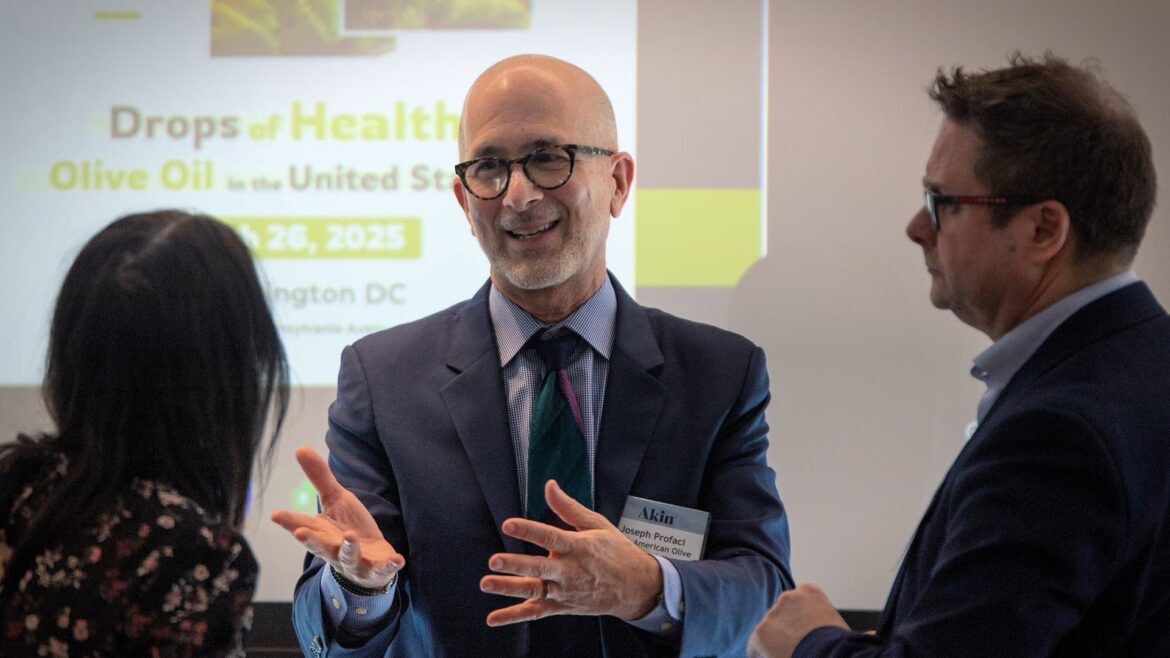Summary
The Olive Oil World Congress in Washington, D.C., focused on promoting the health benefits of extra virgin olive oil and lobbying for its exemption from tariffs, despite ongoing trade policy uncertainty in the United States. Organizers emphasized the importance of educating consumers, farmers, and policymakers to drive demand, increase domestic production, and ensure long-term benefits for the industry, arguing that tariffs could negatively impact access to this healthy product for lower-income families and disrupt the trend of consumers shifting towards olive oil over seed oils.
A recent Olive Oil World Congress event in Washington, D.C., came amid continued uncertainty about the United States’s trade policy.
About one week after it announced sweeping reciprocal tariffs on nearly every country, President Donald J. Trump announced a 90-day pause to these tariffs, opting to keep a base rate of ten percent in place instead.
Organizers, including the North American Olive Oil Association (NAOOA), said the event is part of an ongoing effort to lobby for olive oil’s exemption from any tariff regime.
Olive oil is a cornerstone of the Mediterranean diet. Even modest increases in its use by Americans could significantly impact public health.- Joseph R. Profaci, executive director, NAOOA
“The event focused on the health benefits of extra virgin olive oil and strategies to promote its use among Americans,” Joseph R. Profaci, the NAOOA’s executive director, told Olive Oil Times.
“It wasn’t about tariffs, and we didn’t talk about tariffs directly,” he added. “But we did discuss the two reasons why olive oil should be exempted.”
The first reason is the uniquely healthy profile of extra virgin olive oil, supported by decades of scientific research. “The second reason is that the U.S. doesn’t produce enough olive oil,” Profaci said.
See Also:As U.S. Firms Back Off Climate Targets, Olive Oil Companies Stay the Course
Over the past 30 years, extra virgin olive oil consumption has tripled in the United States.
However, U.S. producers lament insufficient awareness about olive oil’s health benefits.
According to estimates from the International Olive Council (IOC), the U.S. is expected to consume 398,000 metric tons of olive oil during the 2024/25 crop year, surpassing Italy’s estimated 395,000 tons. Globally, only Spain is projected to consume more, at 460,000 tons.
IOC data show that in 2014/15, U.S. olive oil consumption reached 295,000 tons, compared to slightly more than 115,000 tons in 1994/1995.
“Despite fluctuations in recent years, U.S. production never exceeded 15,000 tons per year,” Profaci emphasized, highlighting the vast gap between domestic production and demand.
Around half of U.S. olive oil consumption occurs on the East Coast, with most production concentrated in California, where sustained periods of drought and production costs have hampered producers.
“Olive oil is a cornerstone of the Mediterranean diet. Even modest increases in its use by Americans could significantly impact public health,” Profaci said.
“For example, research found that even a 20 percent increase in adherence to the Mediterranean diet would save the American healthcare system $20 (€17.7) billion annually,” he added.
However, tariffs are expected to drive olive oil prices higher for American consumers.
“That worries me because tariffs risk depriving those who most need access to this healthy product,” Profaci said. “We know from recent experience what happens when prices rise. In 2024, two million fewer American households purchased olive oil compared to 2023.”
“Upon closer examination, nearly all those households had annual incomes under $100,000 (€88,400),” he added. “Unfortunately, lower-income families, who likely benefit the most from improved diets and health outcomes, will suffer disproportionately from these tariffs.”
Obesity rates are notably higher among lower-income populations. Citing recent research from the Harvard T.H. Chan School of Public Health, Profaci highlighted olive oil’s potential as a healthier replacement for commonly used fats.
“One of the most interesting recent studies found that amid America’s obesity crisis, olive oil consumption is inversely associated with weight gain, unlike other fats, including vegetable oils,” Profaci said.
This evidence is among the reasons motivating producers and stakeholders to engage policymakers actively.
During the Washington, D.C., event, a roundtable with Dani Neirenberg of Food Tank discussed strategies for increasing domestic olive oil production. Participants agreed that education is key.
“We need to educate consumers to drive demand, farmers to recognize the economic and market potential in olive cultivation and policymakers to understand the long-term benefits of promoting olive oil production in the U.S.,” Profaci said.
According to Profaci, the current tariffs negatively affect the industry’s present and future.
“They interrupt a trend of consumers moving away from seed oils toward olive oil,” he warned. “Consumers typically begin with basic olive oil products, become educated, and gradually choose higher-quality olive oils over time.”
Profaci noted that this beneficial cycle helped maintain overall consumption levels despite recent shortages and a 25 percent price increase.
“By interrupting the entryway here, it’s a problem for the industry in the long term,” Profaci added.
At the Washington event, an olive oil producer suggested that tariffs might benefit producers by raising prices. Profaci disagreed.
“In the end, it hurts us because our growth depends on expanding the consumer base. Higher prices mean fewer potential lifelong customers,” he said.
The event, co-organized by NAOOA, also aimed to secure support for producers’ applications regarding establishing a standard of identity and an ag-product promotion group through a research and promotion order.
“Olive oil is good for our health and as a sustainable product, the health of our planet. Two factors that should be on the top of policymakers’ priority list,” Profaci concluded.

